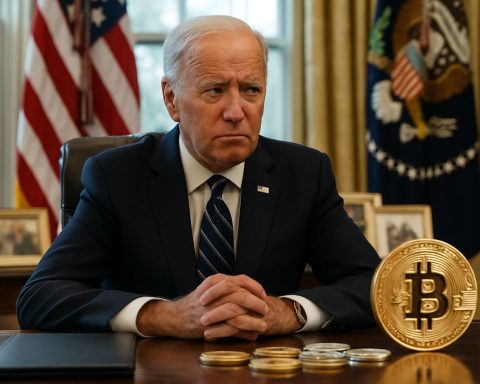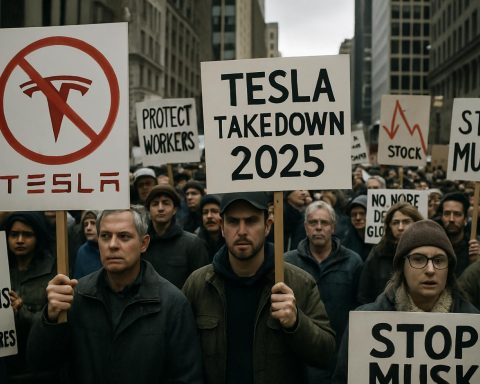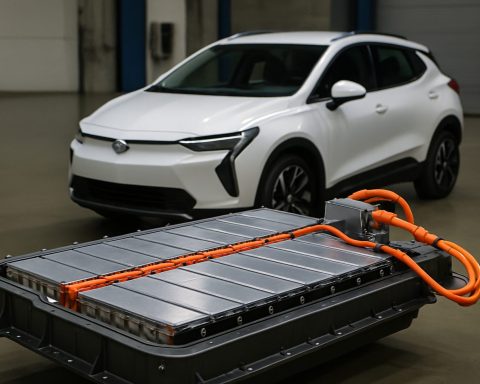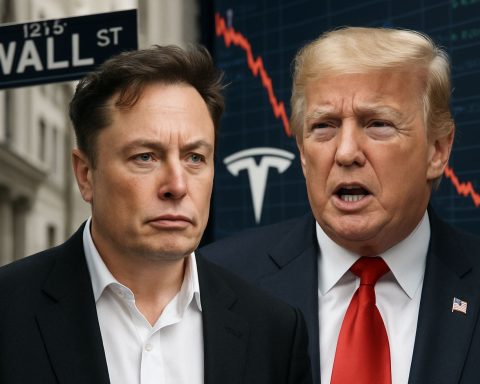- The UK aims to lead in renewable energy amidst global economic shifts, countering the US’s renewed focus on fossil fuels.
- Prime Minister Keir Starmer’s government introduces substantial funding and infrastructure upgrades to attract green energy investors.
- A $399.4 million commitment to offshore wind projects showcases the UK’s leadership in this area.
- A London summit, featuring 60 nations, including European Commission President Ursula von der Leyen, emphasizes the UK’s dedication to its green agenda.
- Starmer links the move towards net-zero emissions with national security and economic resilience against fossil fuel volatility.
- By capitalizing on international investment trends, the UK positions itself as a prime destination for clean energy funds.
- Despite internal criticisms, the UK stresses its strategic commitment to embedding renewable energy within national industrial strategies.
- The UK’s renewable energy push is seen as a strategic step towards global economic influence and sustainability.
Amidst the simmering tensions of global economic realignments, the UK is stepping onto the world stage with a crisp ambition: to reign as a leader in renewable energy. As the United States revisits its energy policies under the Trump administration’s renewed focus on fossil fuels, the UK sees an opportunity to entice international investors seeking stability and growth in the burgeoning green energy sector.
Prime Minister Keir Starmer’s Labour government is harnessing this geopolitical climate by unfurling new environmental initiatives and substantial funding packages aimed at transforming the UK’s renewable energy landscape. The country is not only offering cash incentives but also laying out infrastructure upgrades to attract companies that specialize in manufacturing and clean energy supply chains. The stakes are high, with a bold promise of $399.4 million for offshore wind projects, an area where the UK already claims a commanding lead.
Against this backdrop, a grand summit in London has gathered representatives from over 60 nations, including notable figures like European Commission President Ursula von der Leyen, underscoring the UK’s determination to accelerate its green transition. Starmer’s declaration at this gathering was unequivocal: the drive towards net-zero carbon emissions is a strategic imperative intertwined with national security and economic prowess. He insists that cultivating a robust renewable energy sector is not just about ecological responsibility but about shielding the nation’s economy from the unpredictability of fossil fuel dependencies.
The strategic play extends beyond just environmental benefits. By extending open invitations to global investors, the UK seeks to ride the wave of international clean energy funds that have been growing in potence. There is an understanding here that investment trends are gravitating towards regions offering stable returns in the renewable domain, and the UK’s proactive stance could very well secure it as a prime destination for such investments.
However, the journey is not without internal criticism. The Labour government faces scrutiny over its commitment to previous energy pledges, sparking debates on whether current moves are robust enough or simply reactive. Yet, the government’s renewed vigor in addressing these concerns points to a potential recalibration, aimed at truly embedding green initiatives into the fabric of the country’s industrial strategies.
In contrast, as the US grapples with halting projects like the proposed wind farm off New York’s coast, the UK is resolute in its pursuit of renewable dominance. There is a palpable sense of urgency in Starmer’s speeches — a drumbeat that aligns climate strategies with economic stability and national security, marking this chapter in the UK’s energy narrative as both ambitious and strategic.
As the world watches this unfolding drama, the takeaway is clear: the UK’s investment in renewable energy is about more than just cleaner skies. It’s an emphatic bid to redefine its role on the global stage, ready to surge ahead in a future where green is not just an option, but an essential strategy for survival and prosperity.
The UK’s Bold Ambition to Lead in Renewable Energy: What You Need to Know
The UK’s Renewable Energy Strategy: Key Facts and Developments
The UK is positioning itself as a front-runner in the renewable energy sector amidst global economic shifts. The Labour government, led by Prime Minister Keir Starmer, has launched substantial initiatives to boost the country’s green energy capabilities, aimed at attracting international investors. Here are some in-depth insights and additional facts about this strategic move:
Renewable Energy Initiatives and Investments
1. Investment in Offshore Wind Projects: The UK has allocated nearly $399.4 million to bolster its already robust offshore wind industry. This investment underscores the UK’s leadership position in offshore wind capacity, with plans to significantly increase output over the next decade.
2. Infrastructure and Incentives: Alongside financial investments, the UK is enhancing infrastructure to support the renewable energy supply chain. Cash incentives are being offered to lure companies focusing on manufacturing and clean energy technology development.
3. Green Energy Summit: The recent summit in London featured leaders from over 60 countries, with the participation of European Commission President Ursula von der Leyen. This gathering highlighted the UK’s commitment to international collaboration in achieving net-zero carbon emissions and economic growth through green energy.
Strategic Importance of Renewable Energy
– Economic Growth and Stability: By prioritizing renewable energy, the UK aims to shield its economy from the volatility of fossil fuel markets. Stable, clean energy solutions are seen as pivotal to long-term economic security.
– National Security: The push towards renewable energy is framed as a national security imperative. By reducing dependency on fossil fuels, the UK seeks to enhance its energy independence and resilience.
Challenges and Controversies
– Domestic Criticism: Despite these ambitious plans, the Labour government faces criticism about the pace and scale of its renewable energy commitments. Some critics claim that existing projects need more support and faster implementation to meet previous energy pledges.
– Comparison with the US: While the UK is making rapid strides in renewables, the US is experiencing setbacks, such as the halting of wind farm projects off New York’s coast. This contrast highlights different national approaches and the UK’s unwavering commitment to renewable energy development.
Future Outlook and Market Trends
– Rising Global Investments: The international market for clean energy investments is expanding. The UK’s proactive strategies are likely to position it as an attractive destination for global clean energy funds.
– Renewable Energy Market Growth: Experts predict that the global renewable energy market will continue to grow, driven by advancements in technology, increased demand for clean energy, and supportive government policies. The UK is well-positioned to capitalize on these trends.
Actionable Recommendations for Stakeholders
– For Investors: Consider diversifying portfolios by investing in UK-based renewable energy projects. The UK’s stable political climate and strong commitment to renewable energy offer promising opportunities for profitable returns.
– For Policymakers: Keep fostering international partnerships and collaborative projects to accelerate the transition to renewable energy globally. This approach can enhance technological advancements and share best practices.
– For Businesses: Embrace green technologies and sustainability practices in operations. Companies that adapt to renewable energy trends stand to benefit from cost savings, regulatory incentives, and enhanced brand reputation.
Quick Tips for Individuals
– Energy Efficiency at Home: Start small by improving energy efficiency in your household. Simple actions like using LED bulbs, investing in smart thermostats, and optimizing insulation can make a significant impact.
– Support Clean Energy: Choose energy suppliers that offer green energy alternatives. Supporting clean energy providers helps drive demand and investment in renewable technologies.
For more information on the UK’s renewable energy initiatives, visit the UK Government website.











